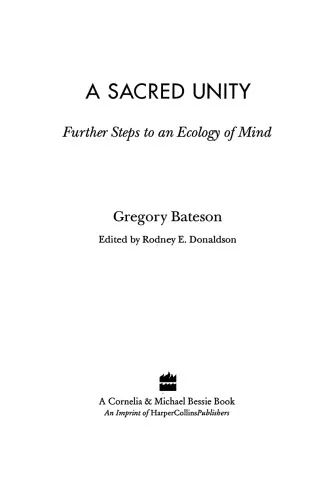A Sacred Unity: Further Steps to an Ecology of Mind
4.6
Reviews from our users

You Can Ask your questions from this book's AI after Login
Each download or ask from book AI costs 2 points. To earn more free points, please visit the Points Guide Page and complete some valuable actions.Introduction to 'A Sacred Unity: Further Steps to an Ecology of Mind'
Welcome to A Sacred Unity: Further Steps to an Ecology of Mind by Gregory Bateson, edited by Rodney E. Donaldson. This book is a profound exploration of the interconnections between ecological systems and the human mind. It delves into the intricate complexities of life, mind, and the underlying systems that govern our existence, encouraging readers to consider the sacred unity that binds them.
Detailed Summary of the Book
This book is a compilation of essays and lectures by anthropologist and systems theorist Gregory Bateson. It extends the ideas presented in Bateson's earlier works, emphasizing the intricate and reciprocal relationship between the human mind and the environment. The text traverses diverse fields, including anthropology, psychology, cybernetics, and ecology, reflecting Bateson's interdisciplinary approach.
The essays in this collection explore themes such as communication, the pattern which connects, the concept of the "double bind," and the idea of mind and nature as a singular, complex system. Bateson argues that understanding these connections is crucial to addressing contemporary ecological and social issues, advocating for an integrated approach to knowledge that transcends disciplinary boundaries.
Key Takeaways
- The intertwined nature of ecosystems and human consciousness.
- The necessity of an interdisciplinary approach to problem-solving.
- The importance of recognizing patterns and systems that connect different aspects of life.
- Insights into communication and learning processes.
Famous Quotes from the Book
"The major problems in the world are the result of the difference between how nature works and the way people think."
"It is impossible, in principle, to explain any pattern by invoking a single causal factor."
Why This Book Matters
The relevance of A Sacred Unity lies in its visionary perspective on ecological and mental health. Bateson's insights offer valuable lessons for understanding the interconnectedness of life systems in a time when ecological crises and mental health challenges are increasingly prominent. By advocating for a holistic epistemology, Bateson encourages both scholars and laypeople to consider a more comprehensive approach to life, emphasizing balance and interconnectedness rather than isolation and fragmentation.
Through his pioneering work, Bateson has influenced not only anthropologists and systems theorists but also ecologists, psychologists, and educators. This book continues to inspire new generations to think critically about the world around them and their role within it.
In conclusion, A Sacred Unity: Further Steps to an Ecology of Mind offers readers a deep dive into the philosophical and theoretical frameworks that address the indispensable relationship between mind and environment. It calls for a reconsideration of how knowledge is constructed, urging a linguistic and cognitive shift that unifies diverse fields for the betterment of both humanity and the natural world.
Free Direct Download
Get Free Access to Download this and other Thousands of Books (Join Now)
For read this book you need PDF Reader Software like Foxit Reader
Accessing books through legal platforms and public libraries not only supports the rights of authors and publishers but also contributes to the sustainability of reading culture. Before downloading, please take a moment to consider these options.
Find this book on other platforms:
WorldCat helps you find books in libraries worldwide.
See ratings, reviews, and discussions on Goodreads.
Find and buy rare or used books on AbeBooks.


